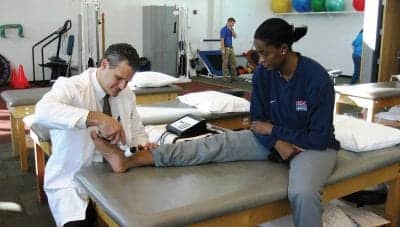September 10, 2007
Young asthma sufferers who are able to raise their level of physical fitness are likely to experience improved disease control and quality of life, according to a study published recently in Medicine & Science in Sports & Exercise, the official journal of the American College of Sports Medicine (ACSM).
The results show aerobic training effective in improving cardiopulmonary fitness and contributing to decreased daily use of inhaled steroids in asthmatic children. The outcomes have positive implications for disease management in a group that tends to have lower cardiorespiratory fitness than their non-asthmatic counterparts.
"Children who experience breathing restrictions caused by asthma sometimes fear inducing breathlessness by exercise, which can cause physical deconditioning over time," said Celso Carvalho, PhD, one of the study’s authors. "This is where we often see patients with asthma having lower fitness levels. Physical training, properly supervised, is not only a possibility for this group, but also a management strategy for their symptoms."
The study enrolled 38 children with moderate-to-severe persistent asthma, randomly assigned to either a training group or a control group. Exercise performance and exercise-induced bronchoconstriction was evaluated 16 weeks apart, while daily doses of inhaled steroids and Pediatric Asthma Quality of Life Questionnaire (PAQLQ) scores also were recorded.
Asthmatic children, even with moderate to severe disease, showed significant improvements in their aerobic capacity after the training program and a reduction in exercise induced-bronchoconstriction, which induces breathlessness and is a characteristic response to exercise present in most patients. Daily doses of inhaled steroids were reduced in trained patients by 52 percent, but remained unchanged or increased in the control (untrained) group. When compared to controls, these children also reported a significant improvement in health-related quality of life.
The authors emphasize that training should be supervised and performed in children properly medicated, and the actual impact of physical training on clinical indicators of disease control is unknown. While these data suggest an adjunct role of physical conditioning on clinical management of patients with more advanced disease, additional research is warranted to discover the contribution of exercise on asthma symptoms and its manifestations.
Source: American College of Sports Medicine




